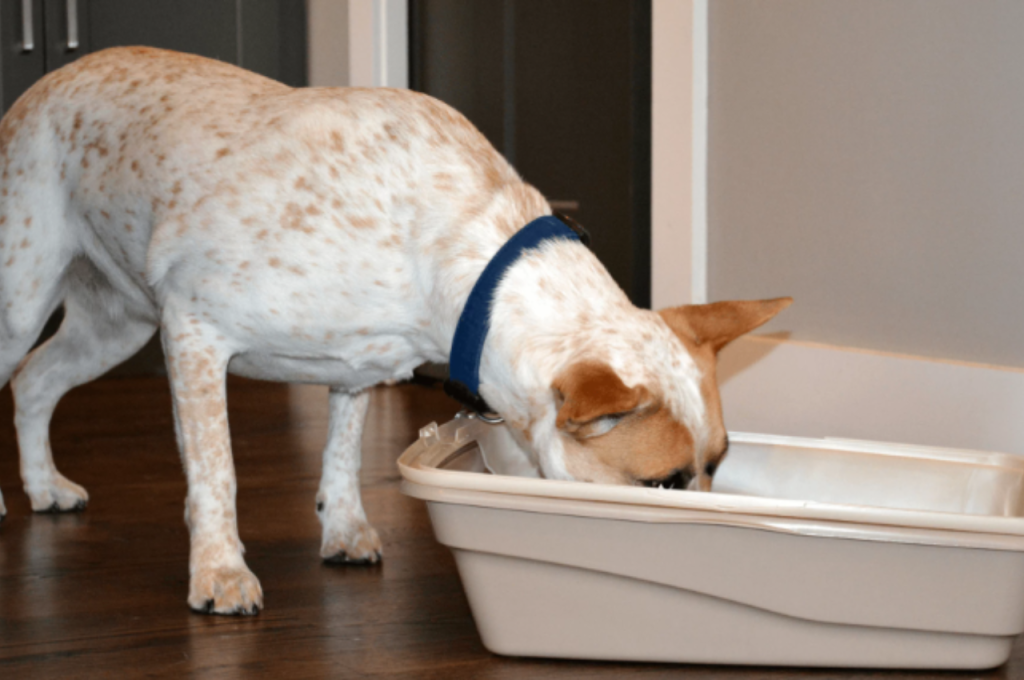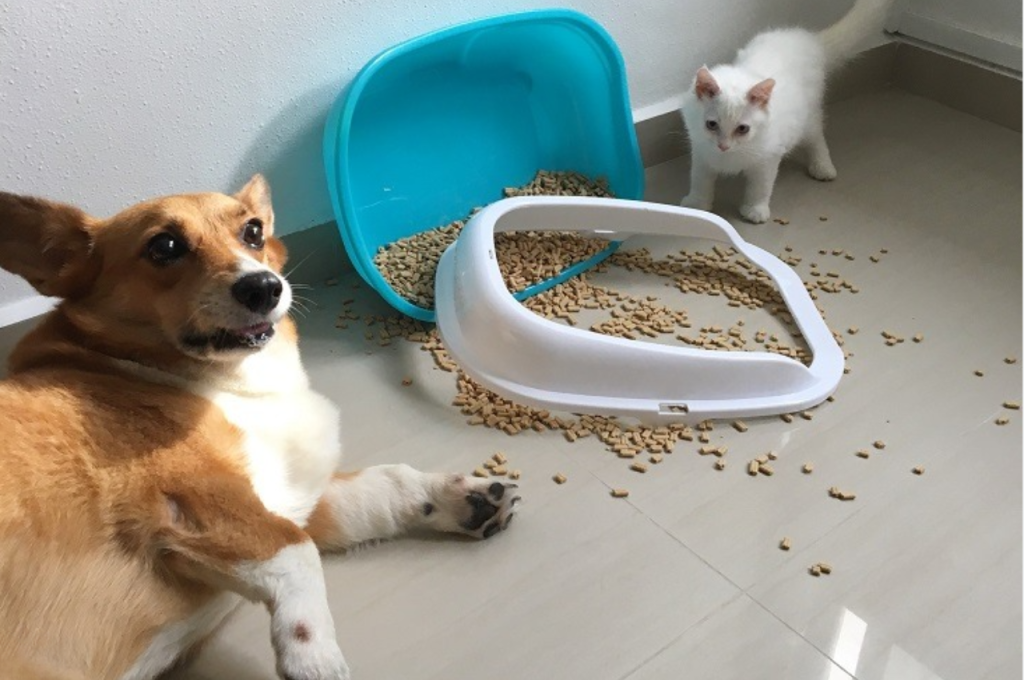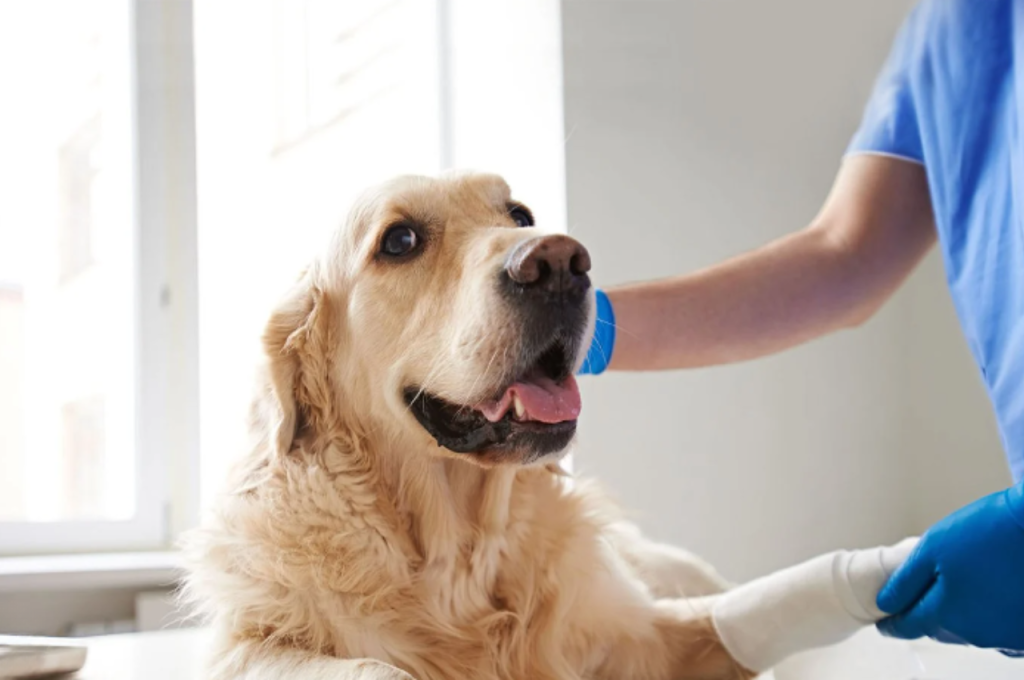Dogs may eat cat poop due to their instinctive scavenger behavior. This habit is known as coprophagy and can be harmful to their health.
Dogs have a natural scavenger instinct to explore and consume anything they discover, including feces. This behavior is known as coprophagy, and while it may be normal for dogs, it can have adverse effects on their health. The consumption of cat poop exposes dogs to parasites, bacteria, and viruses that can lead to stomach upset, vomiting, and diarrhea.
Some of these parasites can also be transmitted to humans, making it essential to address this behavior promptly. We will explore the reasons why dogs eat cat poop and how to prevent this behavior.
Understanding the Behavior
Dogs have an instinct to eat feces. Though it is not entirely clear why dogs eat cat poop, it is believed to be due to their strong sense of smell and taste, as well as a lack of certain nutrients in their diet.

Understanding this behavior can help dog owners prevent it from happening.
An Overview of Coprophagia
Coprophagia, or the consumption of feces, is a common behavior among dogs. It may seem gross to us, but to our furry friends, it’s a natural behavior that can have multiple causes. One possible cause of coprophagia in dogs is their ancestry – their ancestors in the wild ate feces to keep their dens clean and free of parasites.
Another possible explanation is that the dog is lacking in nutrients and is trying to make up for the deficiency by eating poop. However, one of the most common reasons that dogs eat cat poop is simply because it smells appealing to them.
The Difference Between Normal and Abnormal Stool Eating
While coprophagia is not considered to be a “normal” behavior, it is important to recognize that there are different types of feces-eating, and some may be more concerning than others. If your dog occasionally eats feces and seems happy and healthy, then it’s likely not anything to be concerned about.
However, if the behavior becomes obsessive and your dog is constantly seeking out feces to eat, then it may be a sign of a more serious problem. Another indication of abnormal stool-eating is when a dog only eats feces from specific animals, such as cats or other dogs. This may be a sign of a nutritional deficiency or a dietary issue. If the feces your dog is eating is from animals that have illnesses or parasites, there is a risk of transmitting those infections to your dog.
Factors Contributing to the Behavior
Dogs often eat cat poop due to instinctual behaviors passed down from their wild ancestors. Additionally, a nutrient-deficient diet or a lack of attention and training can contribute to this behavior.
Factors Contributing to the Behavior Dogs eating cat poop isn’t just a disgusting habit – it’s a common behavior in many pooches. Although it’s hard to understand why dogs choose to indulge in such behavior, several factors contribute to it. Understanding these factors can help you prevent your furry friend from eating poop and ensure their overall health and well-being.
Medical Reasons Behind Coprophagia One of the possible reasons for dogs eating cat poop is medical conditions. If your dog isn’t getting the nutrients they require from their regular diet, they may resort to eating feces. Intestinal malabsorption, exocrine pancreatic insufficiency (EPI), or other digestive system issues can make it difficult for them to absorb nutrients from their food, leaving them hungry. Additionally, medical conditions like diabetes or Cushing’s disease can cause increased appetite, leading to coprophagia.
Behavioral Reasons: Anxiety, Boredom, and Hunger Aside from medical reasons, behavioral factors also have a significant contribution to dogs’ coprophagia habit. Dogs who are experiencing anxiety or stress may start eating poop as a self-soothing or coping mechanism.
Furthermore, dogs who are bored and lack stimulation may start eating poop as a means of amusement. Lastly, dogs that don’t get enough food or are on a restricted diet may resort to eating feces. Preventing Your Dogs from Eating Cat Poop Prevention is always better than cure, and the same goes for coprophagia in dogs. To stop your dog from eating cat poop, you need to take some measures, such as:
• Keep litter boxes clean by frequently scooping and cleaning them.
• Supervise your dog while they’re outside and distract them from the litter box area.
• Provide your dog with a balanced and nutritious diet filled with a range of nutrients.
• Provide your dog with enough playtime and keep them engaged to prevent boredom.
The Role of Diet in Coprophagia
Dogs eating cat poop, also known as coprophagia, can be the result of their diet. Feeding a balanced and nutritious diet can often prevent coprophagia, while high-carbohydrate, low-digestibility diets can increase the likelihood of the behavior.

Dogs are known to have a peculiar habit of eating cat poop. Although it might be difficult to comprehend why our furry friends indulge in such behavior, research indicates that a dog’s diet has a significant role to play. Coprophagia, the scientific term for poop-eating, can result from poor nutrition, malabsorption, or deficiency in essential nutrients. In this blog post, we will explore the different types of diets that lead to stool eating and the nutritional deficiencies that compel dogs to eat feces.
Types of Diets That Lead to Stool Eating
Certain diets can trigger coprophagia in dogs. Feeding dogs high amounts of sugar and unhealthy fats can result in poor digestion and malabsorption of nutrients. Dogs who are fed low-quality, carbohydrate-heavy kibble may experience an increase in hunger levels, resulting in the eating of feces. Some owners who feed their dogs with a raw food diet that lacks specific vitamins or minerals can also contribute to coprophagia. It is essential to create a nutritionally balanced raw food diet that provides all necessary nutrients, vitamins, and minerals.
The Nutritional Deficiencies that Compel Dogs to Eat Feces
If a dog is deficient in particular nutrients, they may look to feces as an alternative source. Nutrient deficiencies could be caused by a poor diet, malabsorption, or underlying medical conditions, causing dogs to seek out nutrition from other sources.
For instance, dogs that are deficient in vitamin B and trace nutrients like Zinc and Magnesium could indulge in coprophagia. These deficiencies are often caused by poor-quality diets, malabsorption issues, or underlying medical complications like pancreatitis.
Preventing The Behavior
Dogs may eat cat poop for various reasons, including being attracted to the odor or taste. To prevent this behavior, owners should ensure that their dogs have a balanced diet, keep litter boxes out of reach, and provide enough exercise and mental stimulation.
If you are a dog owner, you might have noticed that your dog has some strange eating habits – including eating cat poop. Although it seems gross to humans, eating feces is a common behavior in dogs. As pet owners, we should know why dogs engage in such behavior. Here are some reasons why your dog might be eating cat poop:
- Instinct – dogs have an instinctual behavior of scavenging for food, and eating cat poop is one way to satisfy their hunger.
- Nutritional Deficiencies – your dog may not be getting all the necessary nutrients from their food, prompting them to supplement their diet with poop.
- Boredom – dogs need mental stimulation and some dogs might eat cat poop out of boredom.
Train Your Dog with Positive Reinforcement
Training your dog with positive reinforcement can be effective in preventing the behavior of eating cat poop. By rewarding your dog for good behavior, they will be more inclined to listen to you and do as you wish. Here are some training tips:
- If your dog is about to eat cat poop, say “leave it” in a firm tone. When your dog obeys, give him a treat.
- If your dog doesn’t obey, gently redirect his attention to something else. Then, try saying “leave it” again and reward him when he listens. Practice this command regularly.
Keep the Environment Clean and Stimulating
One way to prevent your dog from eating cat poop is to keep the environment clean. If you have a cat at home, make sure the litter box is not accessible to your dog. Place the litter box in a high-up place, inside a baby gate, or behind a closed door. Additionally, you can stimulate your dog mentally and physically. Take your dog out for walks and provide them with toys to play with. Giving your dog a chew toy or puzzle toy can keep them entertained and less likely to eat cat poop.
Treatment Options
So, your dog has been caught red-handed eating cat poop and you’re keen to know the treatment options available. Coprophagia or the habit of consuming feces is not only unhygienic but can also lead to several health problems such as intestinal parasites and infections. Several treatment options can help you control this behavior. These treatment options include medical treatment and behavioral modification programs.
Medical Treatment of Coprophagia
Many pet owners are now turning to medication as a way to control their dog’s tendency to eat poop. Several medications are currently available in the market that help in reducing this behavior. These medications work by making the feces unpalatable to your dog or by suppressing their appetite.

However, any medication should be taken under the guidance of a veterinarian, as it may have side effects or interact with your dog’s current health condition or medication.
Behavioral Modification Programs
Another treatment option available is behavioral modification programs. This involves positive reinforcement training to discourage your dog from consuming poop. This can be done by training your dog to focus on positive behavior and rewarding them for good behavior. You can also try ‘leave it’ commands or diverting their attention from the feces by offering them an alternative treat.
A few examples are:
- Introduce a vitamin supplement that helps in the proper digestion and absorption of nutrients.
- Supervise your dog while taking them for walks, and pick up the cat poop before your dog spots it.
- Clean up the poop as soon as it occurs, to make sure it is not accessible for your dog.
Coprophagia is a common problem that pet owners face, but with the right treatment, it can be managed. It is always advisable to consult a veterinarian before starting any treatment for coprophagia. With patience, consistency, and proper care, your dog can be trained to overcome this behavior.
Conclusion
So, why do dogs eat cat poop? As we’ve discovered, it’s a common behavior that has several potential reasons behind it. From nutritional deficiencies to instinctual behaviors, there are many possible explanations for this strange habit. While it can be frustrating for pet owners, it’s essential to remember that it’s natural and, in most cases, harmless.
By staying on top of your dog’s diet and behavior, you can lessen the likelihood of them turning to the litter box for a snack.
